Emotional Intelligence and Its Importance in the Workplace
VerifiedAdded on 2023/06/15
|7
|1732
|101
AI Summary
This article discusses emotional intelligence and its importance in the workplace. It defines emotional intelligence and its components, and explains how it can help in maintaining harmony among team members and improving productivity. The article also highlights the negative impacts of low emotional intelligence and provides tips on how to develop high emotional intelligence.
Contribute Materials
Your contribution can guide someone’s learning journey. Share your
documents today.
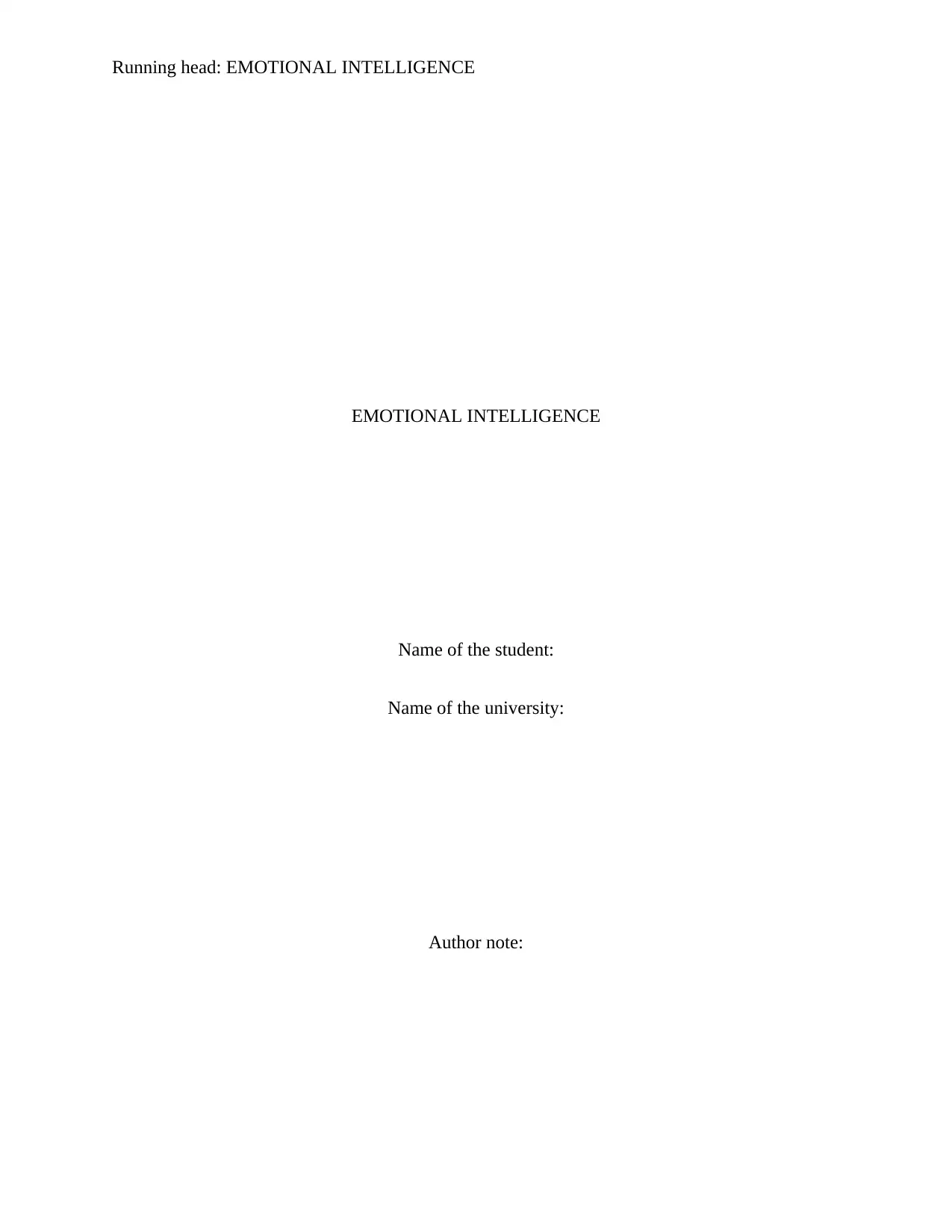
Running head: EMOTIONAL INTELLIGENCE
EMOTIONAL INTELLIGENCE
Name of the student:
Name of the university:
Author note:
EMOTIONAL INTELLIGENCE
Name of the student:
Name of the university:
Author note:
Secure Best Marks with AI Grader
Need help grading? Try our AI Grader for instant feedback on your assignments.
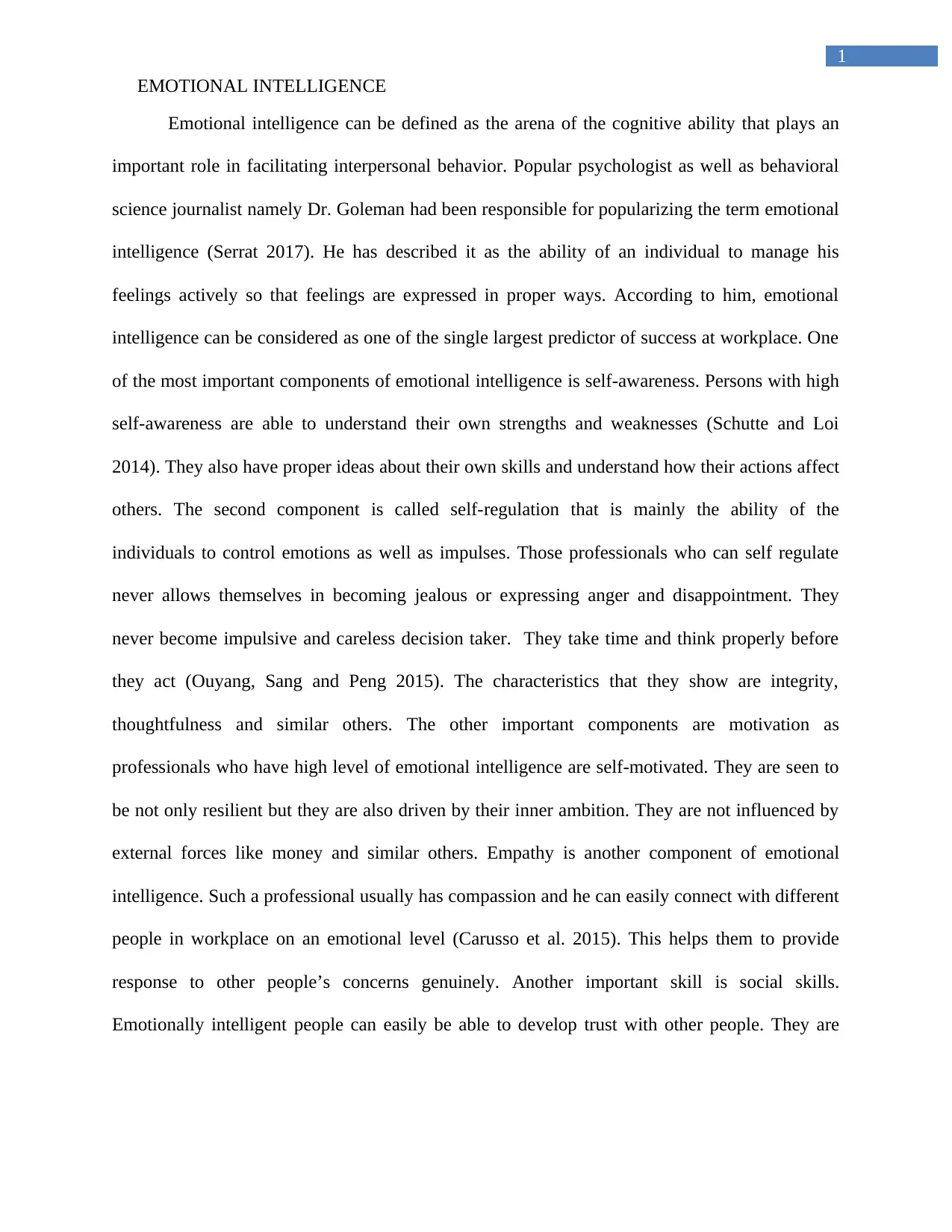
1
EMOTIONAL INTELLIGENCE
Emotional intelligence can be defined as the arena of the cognitive ability that plays an
important role in facilitating interpersonal behavior. Popular psychologist as well as behavioral
science journalist namely Dr. Goleman had been responsible for popularizing the term emotional
intelligence (Serrat 2017). He has described it as the ability of an individual to manage his
feelings actively so that feelings are expressed in proper ways. According to him, emotional
intelligence can be considered as one of the single largest predictor of success at workplace. One
of the most important components of emotional intelligence is self-awareness. Persons with high
self-awareness are able to understand their own strengths and weaknesses (Schutte and Loi
2014). They also have proper ideas about their own skills and understand how their actions affect
others. The second component is called self-regulation that is mainly the ability of the
individuals to control emotions as well as impulses. Those professionals who can self regulate
never allows themselves in becoming jealous or expressing anger and disappointment. They
never become impulsive and careless decision taker. They take time and think properly before
they act (Ouyang, Sang and Peng 2015). The characteristics that they show are integrity,
thoughtfulness and similar others. The other important components are motivation as
professionals who have high level of emotional intelligence are self-motivated. They are seen to
be not only resilient but they are also driven by their inner ambition. They are not influenced by
external forces like money and similar others. Empathy is another component of emotional
intelligence. Such a professional usually has compassion and he can easily connect with different
people in workplace on an emotional level (Carusso et al. 2015). This helps them to provide
response to other people’s concerns genuinely. Another important skill is social skills.
Emotionally intelligent people can easily be able to develop trust with other people. They are
EMOTIONAL INTELLIGENCE
Emotional intelligence can be defined as the arena of the cognitive ability that plays an
important role in facilitating interpersonal behavior. Popular psychologist as well as behavioral
science journalist namely Dr. Goleman had been responsible for popularizing the term emotional
intelligence (Serrat 2017). He has described it as the ability of an individual to manage his
feelings actively so that feelings are expressed in proper ways. According to him, emotional
intelligence can be considered as one of the single largest predictor of success at workplace. One
of the most important components of emotional intelligence is self-awareness. Persons with high
self-awareness are able to understand their own strengths and weaknesses (Schutte and Loi
2014). They also have proper ideas about their own skills and understand how their actions affect
others. The second component is called self-regulation that is mainly the ability of the
individuals to control emotions as well as impulses. Those professionals who can self regulate
never allows themselves in becoming jealous or expressing anger and disappointment. They
never become impulsive and careless decision taker. They take time and think properly before
they act (Ouyang, Sang and Peng 2015). The characteristics that they show are integrity,
thoughtfulness and similar others. The other important components are motivation as
professionals who have high level of emotional intelligence are self-motivated. They are seen to
be not only resilient but they are also driven by their inner ambition. They are not influenced by
external forces like money and similar others. Empathy is another component of emotional
intelligence. Such a professional usually has compassion and he can easily connect with different
people in workplace on an emotional level (Carusso et al. 2015). This helps them to provide
response to other people’s concerns genuinely. Another important skill is social skills.
Emotionally intelligent people can easily be able to develop trust with other people. They are
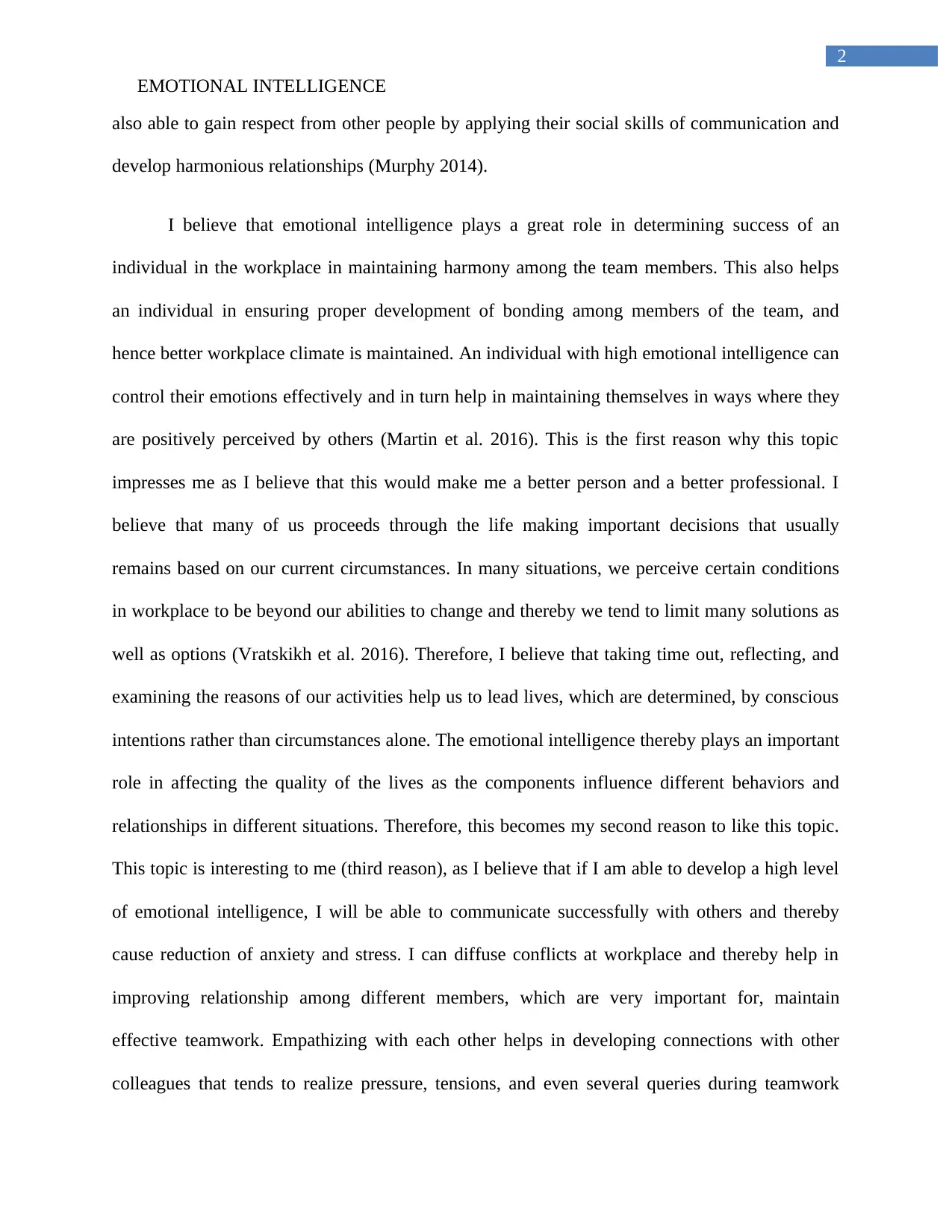
2
EMOTIONAL INTELLIGENCE
also able to gain respect from other people by applying their social skills of communication and
develop harmonious relationships (Murphy 2014).
I believe that emotional intelligence plays a great role in determining success of an
individual in the workplace in maintaining harmony among the team members. This also helps
an individual in ensuring proper development of bonding among members of the team, and
hence better workplace climate is maintained. An individual with high emotional intelligence can
control their emotions effectively and in turn help in maintaining themselves in ways where they
are positively perceived by others (Martin et al. 2016). This is the first reason why this topic
impresses me as I believe that this would make me a better person and a better professional. I
believe that many of us proceeds through the life making important decisions that usually
remains based on our current circumstances. In many situations, we perceive certain conditions
in workplace to be beyond our abilities to change and thereby we tend to limit many solutions as
well as options (Vratskikh et al. 2016). Therefore, I believe that taking time out, reflecting, and
examining the reasons of our activities help us to lead lives, which are determined, by conscious
intentions rather than circumstances alone. The emotional intelligence thereby plays an important
role in affecting the quality of the lives as the components influence different behaviors and
relationships in different situations. Therefore, this becomes my second reason to like this topic.
This topic is interesting to me (third reason), as I believe that if I am able to develop a high level
of emotional intelligence, I will be able to communicate successfully with others and thereby
cause reduction of anxiety and stress. I can diffuse conflicts at workplace and thereby help in
improving relationship among different members, which are very important for, maintain
effective teamwork. Empathizing with each other helps in developing connections with other
colleagues that tends to realize pressure, tensions, and even several queries during teamwork
EMOTIONAL INTELLIGENCE
also able to gain respect from other people by applying their social skills of communication and
develop harmonious relationships (Murphy 2014).
I believe that emotional intelligence plays a great role in determining success of an
individual in the workplace in maintaining harmony among the team members. This also helps
an individual in ensuring proper development of bonding among members of the team, and
hence better workplace climate is maintained. An individual with high emotional intelligence can
control their emotions effectively and in turn help in maintaining themselves in ways where they
are positively perceived by others (Martin et al. 2016). This is the first reason why this topic
impresses me as I believe that this would make me a better person and a better professional. I
believe that many of us proceeds through the life making important decisions that usually
remains based on our current circumstances. In many situations, we perceive certain conditions
in workplace to be beyond our abilities to change and thereby we tend to limit many solutions as
well as options (Vratskikh et al. 2016). Therefore, I believe that taking time out, reflecting, and
examining the reasons of our activities help us to lead lives, which are determined, by conscious
intentions rather than circumstances alone. The emotional intelligence thereby plays an important
role in affecting the quality of the lives as the components influence different behaviors and
relationships in different situations. Therefore, this becomes my second reason to like this topic.
This topic is interesting to me (third reason), as I believe that if I am able to develop a high level
of emotional intelligence, I will be able to communicate successfully with others and thereby
cause reduction of anxiety and stress. I can diffuse conflicts at workplace and thereby help in
improving relationship among different members, which are very important for, maintain
effective teamwork. Empathizing with each other helps in developing connections with other
colleagues that tends to realize pressure, tensions, and even several queries during teamwork
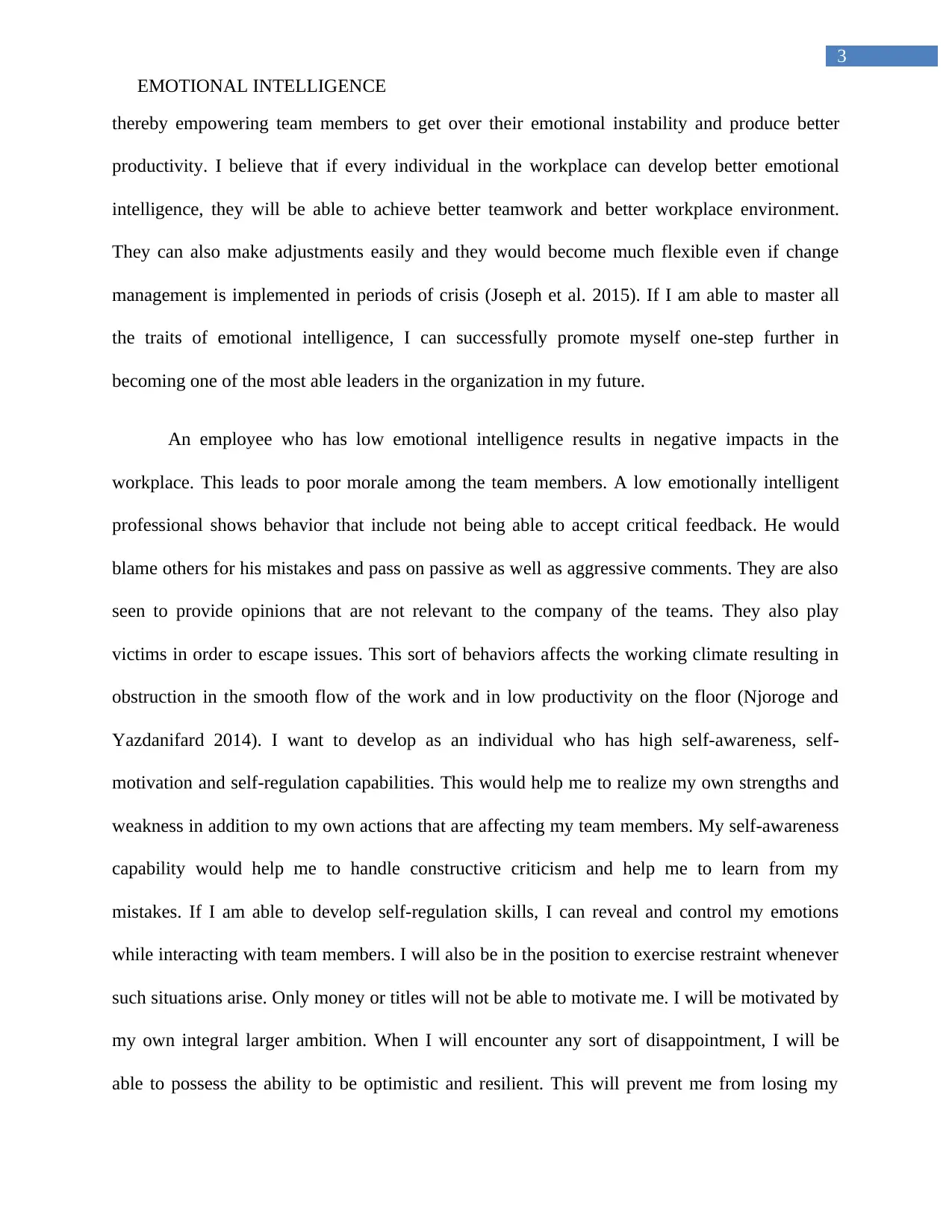
3
EMOTIONAL INTELLIGENCE
thereby empowering team members to get over their emotional instability and produce better
productivity. I believe that if every individual in the workplace can develop better emotional
intelligence, they will be able to achieve better teamwork and better workplace environment.
They can also make adjustments easily and they would become much flexible even if change
management is implemented in periods of crisis (Joseph et al. 2015). If I am able to master all
the traits of emotional intelligence, I can successfully promote myself one-step further in
becoming one of the most able leaders in the organization in my future.
An employee who has low emotional intelligence results in negative impacts in the
workplace. This leads to poor morale among the team members. A low emotionally intelligent
professional shows behavior that include not being able to accept critical feedback. He would
blame others for his mistakes and pass on passive as well as aggressive comments. They are also
seen to provide opinions that are not relevant to the company of the teams. They also play
victims in order to escape issues. This sort of behaviors affects the working climate resulting in
obstruction in the smooth flow of the work and in low productivity on the floor (Njoroge and
Yazdanifard 2014). I want to develop as an individual who has high self-awareness, self-
motivation and self-regulation capabilities. This would help me to realize my own strengths and
weakness in addition to my own actions that are affecting my team members. My self-awareness
capability would help me to handle constructive criticism and help me to learn from my
mistakes. If I am able to develop self-regulation skills, I can reveal and control my emotions
while interacting with team members. I will also be in the position to exercise restraint whenever
such situations arise. Only money or titles will not be able to motivate me. I will be motivated by
my own integral larger ambition. When I will encounter any sort of disappointment, I will be
able to possess the ability to be optimistic and resilient. This will prevent me from losing my
EMOTIONAL INTELLIGENCE
thereby empowering team members to get over their emotional instability and produce better
productivity. I believe that if every individual in the workplace can develop better emotional
intelligence, they will be able to achieve better teamwork and better workplace environment.
They can also make adjustments easily and they would become much flexible even if change
management is implemented in periods of crisis (Joseph et al. 2015). If I am able to master all
the traits of emotional intelligence, I can successfully promote myself one-step further in
becoming one of the most able leaders in the organization in my future.
An employee who has low emotional intelligence results in negative impacts in the
workplace. This leads to poor morale among the team members. A low emotionally intelligent
professional shows behavior that include not being able to accept critical feedback. He would
blame others for his mistakes and pass on passive as well as aggressive comments. They are also
seen to provide opinions that are not relevant to the company of the teams. They also play
victims in order to escape issues. This sort of behaviors affects the working climate resulting in
obstruction in the smooth flow of the work and in low productivity on the floor (Njoroge and
Yazdanifard 2014). I want to develop as an individual who has high self-awareness, self-
motivation and self-regulation capabilities. This would help me to realize my own strengths and
weakness in addition to my own actions that are affecting my team members. My self-awareness
capability would help me to handle constructive criticism and help me to learn from my
mistakes. If I am able to develop self-regulation skills, I can reveal and control my emotions
while interacting with team members. I will also be in the position to exercise restraint whenever
such situations arise. Only money or titles will not be able to motivate me. I will be motivated by
my own integral larger ambition. When I will encounter any sort of disappointment, I will be
able to possess the ability to be optimistic and resilient. This will prevent me from losing my
Secure Best Marks with AI Grader
Need help grading? Try our AI Grader for instant feedback on your assignments.
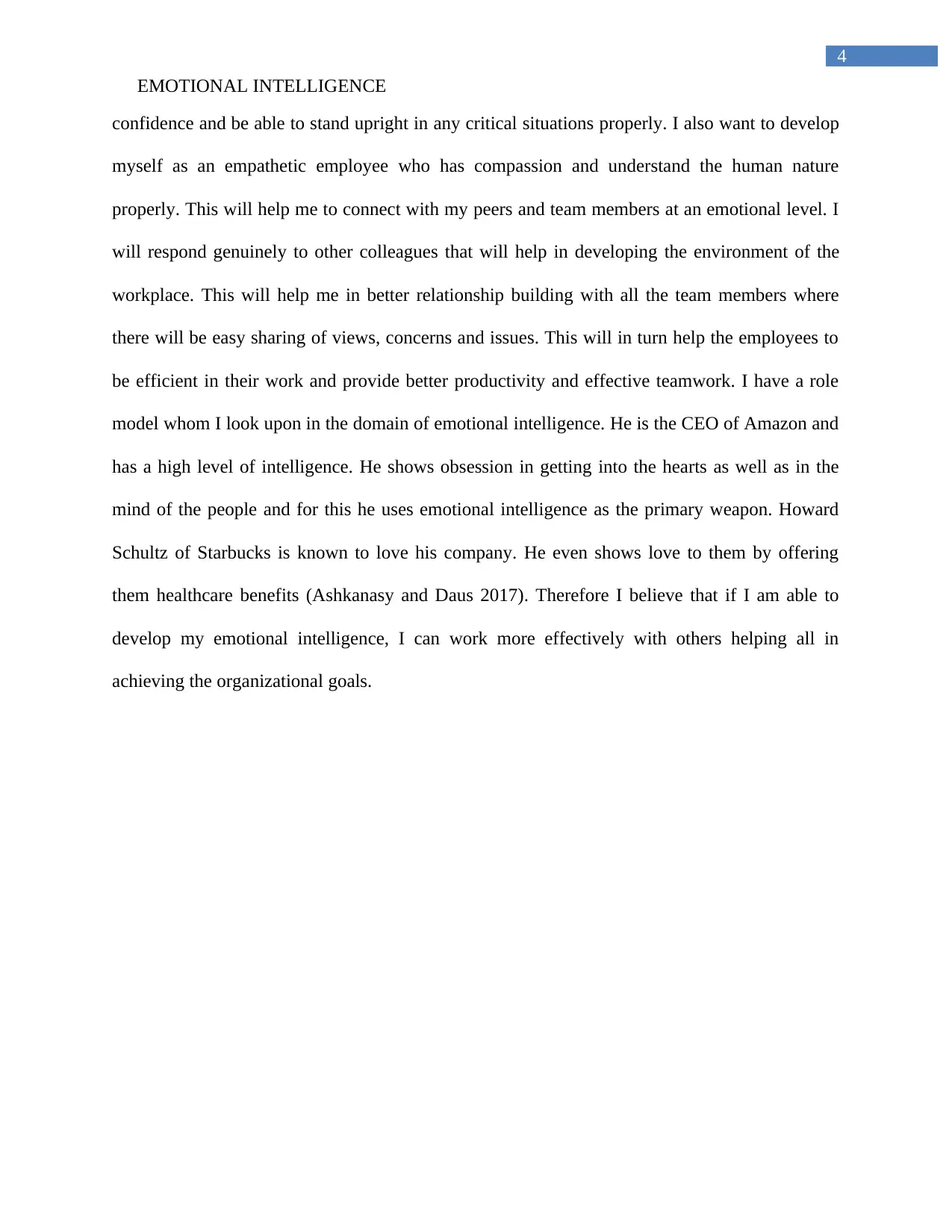
4
EMOTIONAL INTELLIGENCE
confidence and be able to stand upright in any critical situations properly. I also want to develop
myself as an empathetic employee who has compassion and understand the human nature
properly. This will help me to connect with my peers and team members at an emotional level. I
will respond genuinely to other colleagues that will help in developing the environment of the
workplace. This will help me in better relationship building with all the team members where
there will be easy sharing of views, concerns and issues. This will in turn help the employees to
be efficient in their work and provide better productivity and effective teamwork. I have a role
model whom I look upon in the domain of emotional intelligence. He is the CEO of Amazon and
has a high level of intelligence. He shows obsession in getting into the hearts as well as in the
mind of the people and for this he uses emotional intelligence as the primary weapon. Howard
Schultz of Starbucks is known to love his company. He even shows love to them by offering
them healthcare benefits (Ashkanasy and Daus 2017). Therefore I believe that if I am able to
develop my emotional intelligence, I can work more effectively with others helping all in
achieving the organizational goals.
EMOTIONAL INTELLIGENCE
confidence and be able to stand upright in any critical situations properly. I also want to develop
myself as an empathetic employee who has compassion and understand the human nature
properly. This will help me to connect with my peers and team members at an emotional level. I
will respond genuinely to other colleagues that will help in developing the environment of the
workplace. This will help me in better relationship building with all the team members where
there will be easy sharing of views, concerns and issues. This will in turn help the employees to
be efficient in their work and provide better productivity and effective teamwork. I have a role
model whom I look upon in the domain of emotional intelligence. He is the CEO of Amazon and
has a high level of intelligence. He shows obsession in getting into the hearts as well as in the
mind of the people and for this he uses emotional intelligence as the primary weapon. Howard
Schultz of Starbucks is known to love his company. He even shows love to them by offering
them healthcare benefits (Ashkanasy and Daus 2017). Therefore I believe that if I am able to
develop my emotional intelligence, I can work more effectively with others helping all in
achieving the organizational goals.
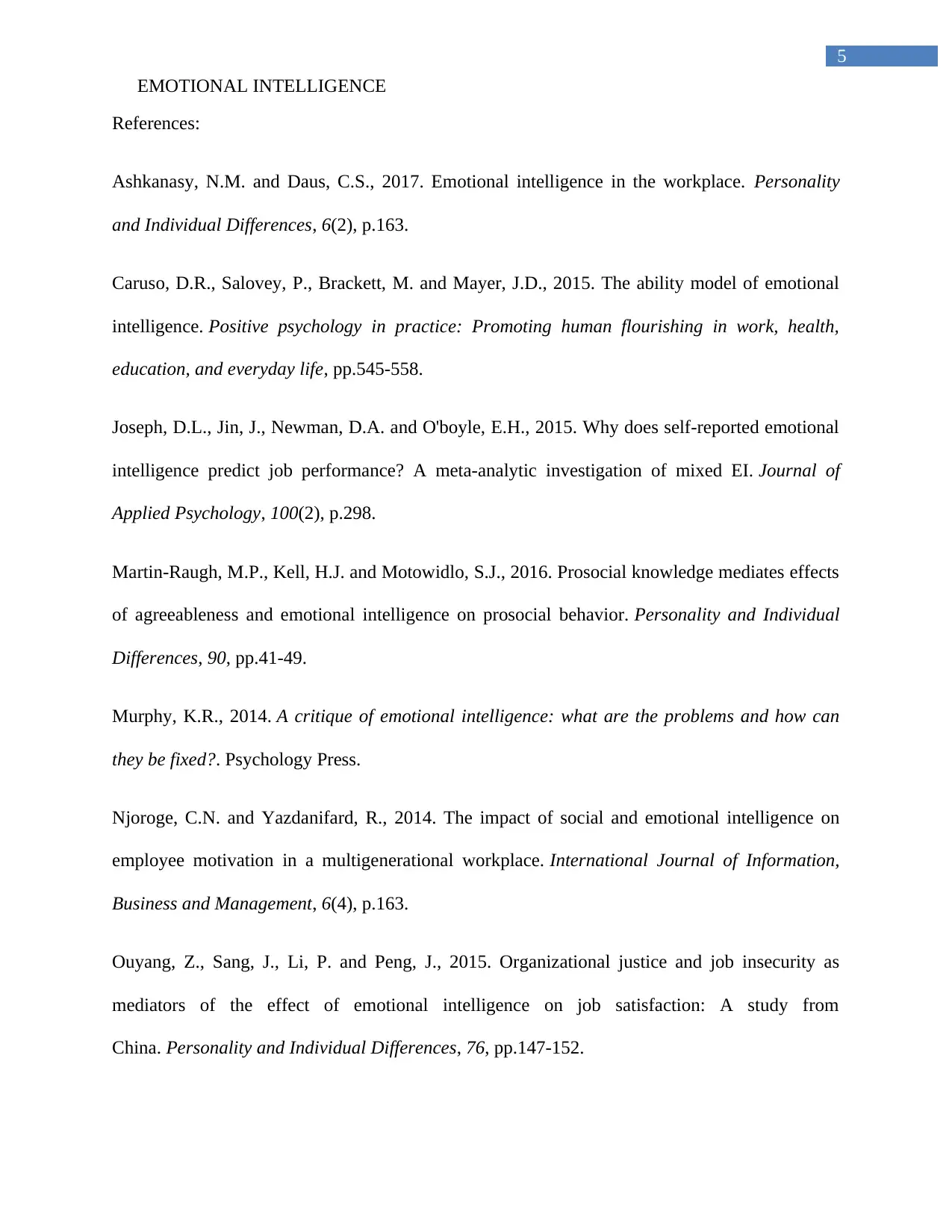
5
EMOTIONAL INTELLIGENCE
References:
Ashkanasy, N.M. and Daus, C.S., 2017. Emotional intelligence in the workplace. Personality
and Individual Differences, 6(2), p.163.
Caruso, D.R., Salovey, P., Brackett, M. and Mayer, J.D., 2015. The ability model of emotional
intelligence. Positive psychology in practice: Promoting human flourishing in work, health,
education, and everyday life, pp.545-558.
Joseph, D.L., Jin, J., Newman, D.A. and O'boyle, E.H., 2015. Why does self-reported emotional
intelligence predict job performance? A meta-analytic investigation of mixed EI. Journal of
Applied Psychology, 100(2), p.298.
Martin-Raugh, M.P., Kell, H.J. and Motowidlo, S.J., 2016. Prosocial knowledge mediates effects
of agreeableness and emotional intelligence on prosocial behavior. Personality and Individual
Differences, 90, pp.41-49.
Murphy, K.R., 2014. A critique of emotional intelligence: what are the problems and how can
they be fixed?. Psychology Press.
Njoroge, C.N. and Yazdanifard, R., 2014. The impact of social and emotional intelligence on
employee motivation in a multigenerational workplace. International Journal of Information,
Business and Management, 6(4), p.163.
Ouyang, Z., Sang, J., Li, P. and Peng, J., 2015. Organizational justice and job insecurity as
mediators of the effect of emotional intelligence on job satisfaction: A study from
China. Personality and Individual Differences, 76, pp.147-152.
EMOTIONAL INTELLIGENCE
References:
Ashkanasy, N.M. and Daus, C.S., 2017. Emotional intelligence in the workplace. Personality
and Individual Differences, 6(2), p.163.
Caruso, D.R., Salovey, P., Brackett, M. and Mayer, J.D., 2015. The ability model of emotional
intelligence. Positive psychology in practice: Promoting human flourishing in work, health,
education, and everyday life, pp.545-558.
Joseph, D.L., Jin, J., Newman, D.A. and O'boyle, E.H., 2015. Why does self-reported emotional
intelligence predict job performance? A meta-analytic investigation of mixed EI. Journal of
Applied Psychology, 100(2), p.298.
Martin-Raugh, M.P., Kell, H.J. and Motowidlo, S.J., 2016. Prosocial knowledge mediates effects
of agreeableness and emotional intelligence on prosocial behavior. Personality and Individual
Differences, 90, pp.41-49.
Murphy, K.R., 2014. A critique of emotional intelligence: what are the problems and how can
they be fixed?. Psychology Press.
Njoroge, C.N. and Yazdanifard, R., 2014. The impact of social and emotional intelligence on
employee motivation in a multigenerational workplace. International Journal of Information,
Business and Management, 6(4), p.163.
Ouyang, Z., Sang, J., Li, P. and Peng, J., 2015. Organizational justice and job insecurity as
mediators of the effect of emotional intelligence on job satisfaction: A study from
China. Personality and Individual Differences, 76, pp.147-152.
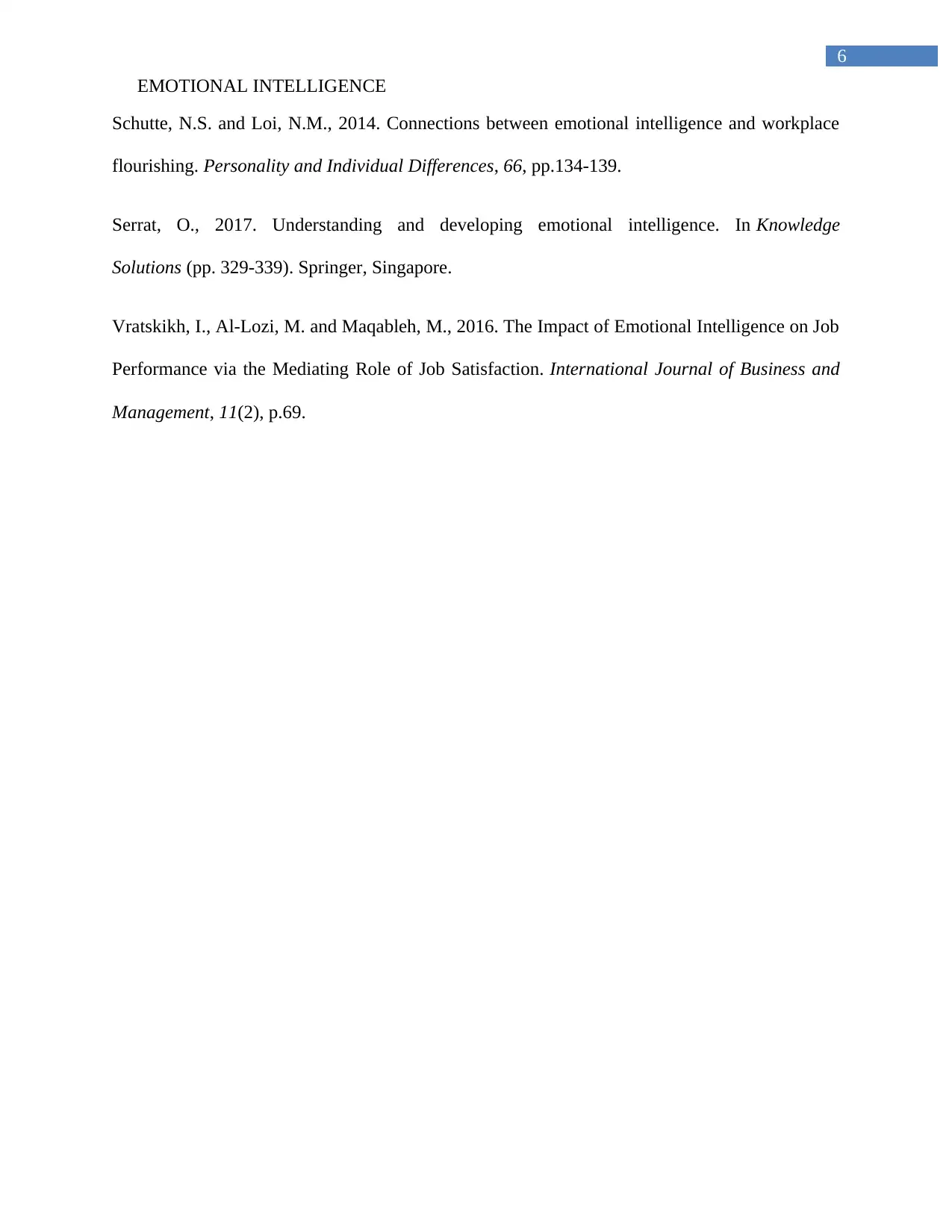
6
EMOTIONAL INTELLIGENCE
Schutte, N.S. and Loi, N.M., 2014. Connections between emotional intelligence and workplace
flourishing. Personality and Individual Differences, 66, pp.134-139.
Serrat, O., 2017. Understanding and developing emotional intelligence. In Knowledge
Solutions (pp. 329-339). Springer, Singapore.
Vratskikh, I., Al-Lozi, M. and Maqableh, M., 2016. The Impact of Emotional Intelligence on Job
Performance via the Mediating Role of Job Satisfaction. International Journal of Business and
Management, 11(2), p.69.
EMOTIONAL INTELLIGENCE
Schutte, N.S. and Loi, N.M., 2014. Connections between emotional intelligence and workplace
flourishing. Personality and Individual Differences, 66, pp.134-139.
Serrat, O., 2017. Understanding and developing emotional intelligence. In Knowledge
Solutions (pp. 329-339). Springer, Singapore.
Vratskikh, I., Al-Lozi, M. and Maqableh, M., 2016. The Impact of Emotional Intelligence on Job
Performance via the Mediating Role of Job Satisfaction. International Journal of Business and
Management, 11(2), p.69.
1 out of 7
Related Documents
Your All-in-One AI-Powered Toolkit for Academic Success.
+13062052269
info@desklib.com
Available 24*7 on WhatsApp / Email
![[object Object]](/_next/static/media/star-bottom.7253800d.svg)
Unlock your academic potential
© 2024 | Zucol Services PVT LTD | All rights reserved.





